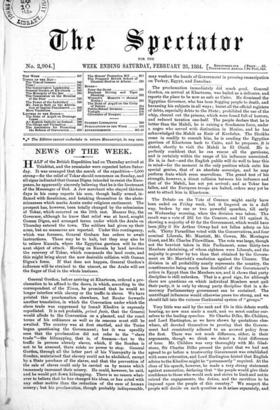General Gordon, before arriving at Khartoum, ordered a pro- clamation
to be affixed to the doors, in which, according to the correspondent of the Times, he promised that he would no longer interfere with slavery or the traffic in slaves. We have printed this proclamation elsewhere, but Reuter forwards another translation, in which the Convention under which the slave trade was suppressed by Ismail Khedive is expressly repudiated. It is not probable, primd fade, that the General would allude to the Convention on a placard, and the exact terms of his ordinance as well as its reasons must still be awaited. The country was at first startled, and the Tories began questioning the Government ; but it was speedily seen that the proclamation did not refer to the "slave trade "—the kidnapping, that is, of freemen—but to the traffic in persons already slaves, which, if the Soudan is not to be annexed, there exists no power to stop. General Gordon, through all the latter part of his Viceroyalty in the Soudan, maintained that slavery could not be abolished, except by a State purchase of the slaves, and that the prevention of the sale of slaves could only be carried on by means which immensely increased their misery. He could, however, he said, and he would put down kidnapping. There is no reason what- ever to believe that he has changed his ideas, or has acted with any other motive than the reduction of the sum of human misery ; but his proclamation, though probably indispensable,
may weaken the hands of Government in pressing emancipation on Turkey, Egypt, and Zanzibar.


































